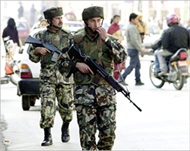Nepal struggles under rebel blockade
Nepal has ordered more troops to patrol highways and warned against hoarding in an effort to break a Maoist blockade across the nation.

The blockade is the biggest challenge so far to King Gyanendra’s seizure of absolute power earlier this month.
Traffic was thin on the ground on the second day of the indefinite transport shutdown called by Maoists rebels to force the king into a U-turn on his decision to sack the government, impose a state of emergency and suspend civil liberties.
Information and Communications Minister Tanka Dhakal said
soldiers had stepped up patrols and set up pickets along the
highways to bolster public confidence, shaken by nine years of conflict that has killed more than 11,000 people.
“People are feeling a little more secure and more are coming
out,” he said, adding that the government had offered to pay
immediate compensation if any vehicle was attacked while defying the rebel ban.
So far, there were no reports of violence.
“We have put out more troops, there are helicopters providing air patrols along the highways,” Dhakal said.
Enough reserves
A government official said there were enough fuel reserves
for Kathmandu’s 1.5 million people and vowed to punish any
retailer found hoarding stocks.
|
“There is confusion and uncertainty among the people. We don’t know how long this will last” Madhav Khanal, resident in western town of Nepalganj |
“We have enough stock, ranging from 15 days to a month,
depending on the oil product,” said Dinesh Chandra Pyakurel,
secretary in the supplies ministry.
“The government has four or five monitoring teams and we
will take action against the hoarders.”
Life in Kathmandu appeared unaffected, and there was no sign of panic buying in city markets despite the blockade.
Capital confusion
On Saturday, the first day of the strike, only 137 vehicles
entered the capital through the main checkpoint of Nagdhunga, compared with 1659 vehicles the previous day, the Himalayan Times said, quoting the army.
 |
|
The military has stepped up troop |
“Nobody can travel because long distance buses are not
running,” said Madhav Khanal, a resident in the western town of Nepalganj. “There is confusion and uncertainty among the people. We don’t know how long this will last.”
The Maoists, who have fought for years to replace the
constitutional monarchy with a communist republic, successfully enforced a blockade of hill-ringed Kathmandu last August through threats alone, without any physical show of force.
Absolute power
Meanwhile, the king, who has blamed the sacked government for failing to contain the Maoist revolt, ordered a crackdown on the Maoists in their remote mountain hideouts and thick jungles to force them to resume talks, cut off since August 2003.
The rebels said on Saturday the king’s 1 February power grab
had ended all possibility of early peace talks.
Instead, they urged the country’s warring political parties to unite with them to fight the monarchy.
The king’s decision to take absolute power prompted protests from many countries.